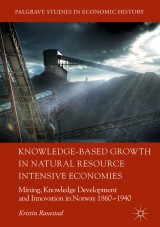Details

Knowledge-Based Growth in Natural Resource Intensive Economies
Mining, Knowledge Development and Innovation in Norway 1860-1940Palgrave Studies in Economic History
|
106,99 € |
|
| Verlag: | Palgrave Macmillan |
| Format: | |
| Veröffentl.: | 07.11.2018 |
| ISBN/EAN: | 9783319964126 |
| Sprache: | englisch |
Dieses eBook enthält ein Wasserzeichen.
Beschreibungen
<div><p>This book rejects the idea that natural resource industries are doomed to slow growth. Rather, it examines the case of Norway to demonstrate that such industries can prove highly innovative and dynamic.</p><p>Here, the case is compellingly made that a key empirical problem with the popular ‘resource curse’ argument is that some of the richest countries in the world – namely Norway, Sweden, Canada and Australia – have all developed fast-growing economies based on natural resources. Analysis of innovation and knowledge development in natural resource industries reveal important new insights about the role of learning and innovation. These insights are key to understanding variances in growth levels between natural resource-based economies. </p><p>Ranestad illustrates how Norway’s high economic performance is built on knowledge-based natural resource industries. While Norwegian industries may have originated because of foreign technology and expertise, they thriveddue to further developments carried out by organisations within Norway. Ranestad looks at how these developments were possible due to the country’s high level of human capital, capacity for knowledge absorption and ability to adapt to new global technological and economic circumstances.</p></div>
<p>Part I: Theoretical and Historiographical Framework.- Chapter 1: Introduction.- Chapter 2: An Innovative and Growing Mining Sector.- Part II: Knowledge Development in Technologically Complex Mining: A Framework.- Chapter 3: Catching-up with World Mining: A Model of Mining Knowledge.- Part III: A Historical Empirical Analysis of Knowledge Organisations.- Chapter 4: The University, the Norwegian Institute of Technology (NIT), Technical Schools and the Mining School.- Chapter 5: Mining Companies: Domestic and Foreign Businesses.- Chapter 6: The Capital Goods Industry.- Chapter 7: National Geological Survey of Norway.- Part IV: Conclusion.- Chapter 8: Concluding Discussion and Remarks.</p>
<b>Kristin Ranestad</b> is a Postdoctoral Fellow at the University of Oslo, Norway. Her research interests are in economic history, global history and the history of technology.
<p>This book rejects the idea that natural resource industries are doomed to slow growth. Rather, it examines the case of Norway to demonstrate that such industries can prove highly innovative and dynamic. </p>
<p>Here, the case is compellingly made that a key empirical problem with the popular ‘resource curse’ argument is that some of the richest countries in the world – namely Norway, Sweden, Canada and Australia – have all developed fast-growing economies based on natural resources. Analysis of innovation and knowledge development in natural resource industries reveal important new insights about the role of learning and innovation. These insights are key to understanding variances in growth levels between natural resource-based economies. </p>
<p>Ranestad illustrates how Norway’s high economic performance is built on knowledge-based natural resource industries. While Norwegian industries may have originated because of foreign technology and expertise, they thriveddue to further developments carried out by organisations within Norway. Ranestad looks at how these developments were possible due to the country’s high level of human capital, capacity for knowledge absorption and ability to adapt to new global technological and economic circumstances. </p>
<p><b>Kristin Ranestad</b> is a Postdoctoral Fellow at the University of Oslo, Norway. Her research interests are in economic history, global history and the history of technology.</p>
<p>Here, the case is compellingly made that a key empirical problem with the popular ‘resource curse’ argument is that some of the richest countries in the world – namely Norway, Sweden, Canada and Australia – have all developed fast-growing economies based on natural resources. Analysis of innovation and knowledge development in natural resource industries reveal important new insights about the role of learning and innovation. These insights are key to understanding variances in growth levels between natural resource-based economies. </p>
<p>Ranestad illustrates how Norway’s high economic performance is built on knowledge-based natural resource industries. While Norwegian industries may have originated because of foreign technology and expertise, they thriveddue to further developments carried out by organisations within Norway. Ranestad looks at how these developments were possible due to the country’s high level of human capital, capacity for knowledge absorption and ability to adapt to new global technological and economic circumstances. </p>
<p><b>Kristin Ranestad</b> is a Postdoctoral Fellow at the University of Oslo, Norway. Her research interests are in economic history, global history and the history of technology.</p>
Analyses innovation from a historical perspective in Norway Norway is one of the richest countries in the world based on natural resources Suggests that natural resource intensive industries in high-income economies have been highly knowledge intensive, dynamic and innovative Relevant to courses in economic history, economic geography, innovation studies and innovation economics, science and technology studies, development economics and development studies
Diese Produkte könnten Sie auch interessieren:

Supply Chain Management: Models, Applications, and Research Directions

von: Joseph Geunes, Panos M. Pardalos, H. Edwin Romeijn

149,79 €















